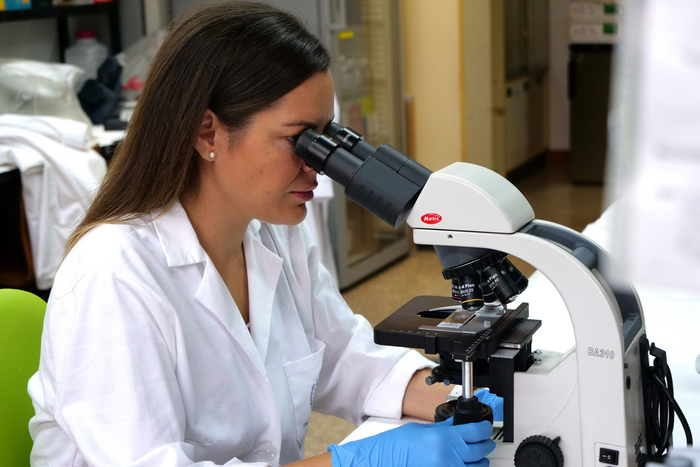A new study conducted by the scientist of the UMA Inés Moreno, in collaboration with the University of Texas, has identified a potential non-invasive therapy that could check the progress of Alzheimer’s disease, “the major form of dementia in the elderly population”.

Credit: University of malaga
A new study conducted by the scientist of the UMA Inés Moreno, in collaboration with the University of Texas, has identified a potential non-invasive therapy that could check the progress of Alzheimer’s disease, “the major form of dementia in the elderly population”.
The researcher of the University of Malaga has managed to reduce the amount of toxic proteins in the brain –which aggregate is the main cause of neuronal death in Alzheimer’s disease– in a preclinical model.
Equilibrium
These proteins are also present in blood, and according to this expert of the UMA they are in equilibrium with the brain –if they increase in the brain, they increase in the blood, and vice versa. Based on these results, Moreno proposes removing these toxic aggregates as a target for Alzheimer’s disease therapy. The paper was published by the scientific journal Molecular Psychiatry, which belongs to the Nature Group.
“Removing the toxic proteins from the brain is the goal of most of the current therapies for Alzheimer’s disease”, explains the researcher of the UMA group “NeuroAD”.
Acting at a circulatory level
The innovation of this research is that it proposes reducing these toxins from the blood, as they are also present in the bloodstream. “We have verified that if we remove toxins from the blood, they drain again from brain to blood in search of equilibrium, improving the clinical signs and pathology of the disease”, says Moreno.
The scientist points out that nowadays the analysis of blood samples is already used, in some cases, for the diagnosis of the disease as an alternative to neuroimage. However, so far it has never been used for the purpose proven in this paper. Consequently, this new use “opens the door to potential non-invasive therapeutic strategies to be implemented at a circulatory level”.
This way, the results proven in animal models have evidenced that this treatment would improve the memory and learning capacity, and correct cognitive impairments, being able not only to remove toxic proteins, but also modify key factors in the development of this disease.
Next step: clinical model
The University of Texas, where Inés Moreno is an associate professor, will continue with this study at a clinical level, seeking to determine the molecular mechanisms involved in this improvement of the disease and, also, if the treatment would work in patients by means of, for instance, dialysis or even transfusions in patients with dementia.
Bibliography:
Urayama, A., Moreno-Gonzalez, I., Morales-Scheihing, D. et al. (2022) Preventive and therapeutic reduction of amyloid deposition and behavioral impairments in a model of Alzheimer’s disease by whole blood exchange. Mol Psychiatry https://doi.org/10.1038/s41380-022-01679-4
Journal
Molecular Psychiatry
Method of Research
Experimental study
Subject of Research
Animals
Article Title
Preventive and therapeutic reduction of amyloid deposition and behavioral impairments in a model of Alzheimer’s disease by whole blood exchange
Article Publication Date
15-Jul-2022




